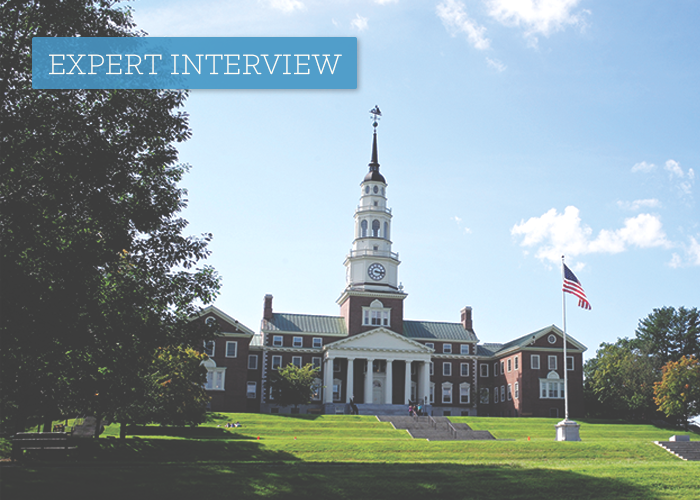Everything You Wanted To Know About Student Debt But Were Afraid To Ask
Today marks the very first Afraid To Ask: TFD’s new expert interview series to launch here at TFD. This series is meant to provide a deeper insight into a variety of subjects, and shed light on things people are sometimes ignorant about (myself included in every topic I cover!). I’ll be interviewing a new individual each week, and diving deep into topics that range from how people have navigated their career path, and learned hard financial advice and lessons for themselves, among other things. I’ll cover both the basic questions and more nuanced aspects of the topic at hand — interviewing people and asking them the questions that a lot of us might be too afraid to ask for fear of looking uninformed (or just downright dumb). For me, this has always been something I’ve struggled with and has been an obstacle I’ve had to overcome. This series with help me (and by extension all of us) combat that feeling!
This week I sat down with (via the internet of course) Andy Josuweit of Student Loan Hero. I wanted to pick his brain a little bit about the website he started, what made him want to launch the site, and understand how his student loans have affected his personal finance profile. I was curious to learn more about the story behind his decision to take on student loans, how they have shaped his future, and the value he sees in Student Loan Hero!
Andy was kind enough to answer my ten questions that follow, and through this interview we can all learn more about the student loan industry, how to pay our loans back, and how you can avoid making some of the mistakes Andy did when he first started out. Check it out!
1. Were you aware of how much student loan debt you were taking on when you signed paperwork for that $80,000? What did you envision that payback process to be like for your future self?
Like most students, I didn’t take out $80,000 in student loans all at once. Rather, every single year I signed the student loan paperwork, which granted loans in increments of $10,000-$15,000 at a time.
Because it added up in small-ish amounts over each time I signed, I was not conscious of what the final price tag was going to be. I think a lot of other students fall into this trap.
The problem is not just the total student loan balance due when you graduate, it’s the fact that you’ll be paying that off for 10+ years at 7% accrued interest on average. For example, the average 2015 graduate finished school with roughly $34,000 in debt, but they are going to pay an extra $12,952 over the lifetime, so the total price tag is actually $46,952.
And if you went to law or medical school, the total debt at graduation is closer to $100k or $200k. And $200k over 10 years, becomes $276,000, while $100k becomes $138,000! Scary stuff…
Despite the amount of debt I had, I envisioned landing a high-paying job right out of school, and being able to pay off my loans quickly. The school I attended even told me I would be making upwards of $80,000 right out of school. The reality was the complete opposite. I graduated in 2009, during the worst job market since the great depression. I couldn’t get a job, and those who did were realistically making around $35,000-$40,000 a year.
Looking back, I don’t know if my expectations were entirely realistic. But, the recession certainly amplified the severity of my financial situation. Moral of the story: on top of whatever you think you’ll graduate with, you need to keep in mind the final price tag after interest, and the future ROI (return on investment) from your education.
2. What were some of the reasons that contributed to your debt ballooning to $106,000? High interest rates, defaulting on payments? Are there any tips on what others can look out for to avoid this from happening.
Since I was unemployed, I couldn’t make all the payments. I was trying to pay my private loans first because the private loans don’t have income-driven repayment options like federal student loans do.
I put my federal students loans in deferment for three years, and accrued approximately $15,000 in interest over this time period. I simply didn’t realize the financial ramifications of deferment, and I think a lot of people other than me fall into the same trap.
I had a call with my loan servicers, they signed me up for the deferment program (which sounded great), but then I woke up to even more debt.
In addition to interest charges from deferment, default and collections played a huge part. I simply couldn’t keep up with the payments, so two loans slipped into default. When I went into default, collection fees of 24.34% were added on top of my balance.
After deferment, I enrolled in Income-Based Repayment. However, because my income was so low, this resulted in negative amortization. This meant that my monthly payments didn’t even cover the interest charges that accrued each month, which left me paying interest on my interest.
My biggest tip isn’t directly related to how you manage your student loans. Instead, I’d say: work on increasing your income. Get the best job possible, and try to at least make minimum monthly payments on your student loans if possible.
Another tip: Avoid entering into deferment just because you don’t want to make monthly payments and it makes your life more comfortable. Finally, whatever you do, don’t default on your student loans. No borrower should end up in default, especially on federal student loans. There are several different federal repayment programs that are borrower-friendly. These options can even reduce your monthly payments to zero, depending on your income. Any income-driven options for federal student loans are better than going into default.
3. In looking for advice for how to pay back those loans effectively, what was the one most difficult question for you to get an answer on?
I’d say it was “Who should I trust?” And “Is this a scam?” When I defaulted, I was getting phones calls from collection agents.
-
I didn’t know if I could trust the collection agency
-
The default rehabilitation options presented to me seemed like a scam
-
I also didn’t know my rights as a student loan borrower, and was getting harassed by the collection agents.
4. If applicable, how did you ultimately find an answer to that question?
After doing a lot of research, I ultimately ended up enrolling in the default rehabilitation program. Once I made on-time payments for nine consecutive months, my loans were successfully rehabilitated.
5. What made you want to start Student Loan Hero?
One day (sometime in 2011), my parents were yelling at me that I needed to do something about my student loan debt. Out of frustration, I said out loud, “It shouldn’t be this confusing. There needs to be a company or software that helps you understand your student loans, and tell you the best strategy to become financially healthy.” That conversation planted the SLH seed.
Then in 2012, my former business partner and I applied to this startup incubator called Start-up Chile. We were accepted on the premise of an entirely different business idea, but we arrived in Chile and I brought up the idea of a way to help student loan borrowers understand their finances, and that’s what we ultimately decided to create.
6. What are some of the most important pieces of advice you would give to someone going through a difficult payback period?
Don’t put your head in the sand – it’s easy to ignore your student loans, but it’s way better to address them ASAP and figure out a repayment plan that fits your financial situation.
Whatever you do, don’t default – There are tons of federal repayment plans offered by your loan servicer that can help you avoid defaulting.
Focus on increasing your income – This is by far the biggest lever that you can pull to help afford your monthly student loan payments. This might mean taking up 1-2 part-time jobs, becoming an Uber driver, or freelancing outside of your 9-to-5 job! I know this might not be easy or fun, but just remember that it can just be temporary until you get your student loans under control.
7. What has running your own site on the topic taught you about the culture of student loans, and going into debt for school and education? Do you feel like it’s all worth it.
Pre-College: I think education is something we all need to invest in, although as a society, we do a poor job calculating potential ROI. In my particular situation, I simply overspent. I went to a school that was too expensive. When having that dinner table conversation about entering college, both parents and young adults need to weigh the risks, potential returns, and future financial ramifications of the college experience.
Post-College: Some people think millennials have some sense of entitlement, and while I hate that kind of talk, I have to confess it is somewhat true. Most college grads want to enjoy their newly found adulthood, but the reality is they should still live like college students after graduation. Also, some financial professionals will disagree, but I strongly believe you need to treat debt like your house is on fire, and extinguish the flames as fast as possible.
I also wish the government would do more to help, like lower interest rates, offer refinancing options, and createt tax breaks to help student loan borrowers successfully repay their student loans.
8. Are there any online resources you would point our readers to help them navigate student loans/loan repayment?
- Student Loan Hero (of course!)
- Studentaid.gov is a great resource
The Consumer Finance Protection Bureau (CFPB) has a section here. (And the cool thing about the CFPB is that you can submit complaints if you are being treated unfairly or illegally by loan servicers.)
9. Are you debt free today? If not, do you have a concrete plan to pay it off and a timeframe in which to do it?
I am not debt free today. I have a little over $90k of student loan debt to go. The good news is that I have paid over $15k in the past year, and am continuing to aggressively pay off the rest. Also, I recently refinanced my student loans which is going to help me save a few thousand dollars of accrued interest!
10. What is the biggest thing about your life that having significant debt has shaped, and what would you want someone to know about how debt changes your life, goals, dreams, etc.
Student loan debt has forced me to become financially savvy at a young age. I’m happy knowing that I’ll never be the one to get a jumbo mortgage on a vacation home, or put my financial health in jeopardy ever again!
So there you have it! An insider’s look at the world of student loans, how they affect a person’s life over the long term, and how you can learn from the mistakes of others in order to better inform yourself for making the tough decisions that lie ahead.
Image via Flickr





